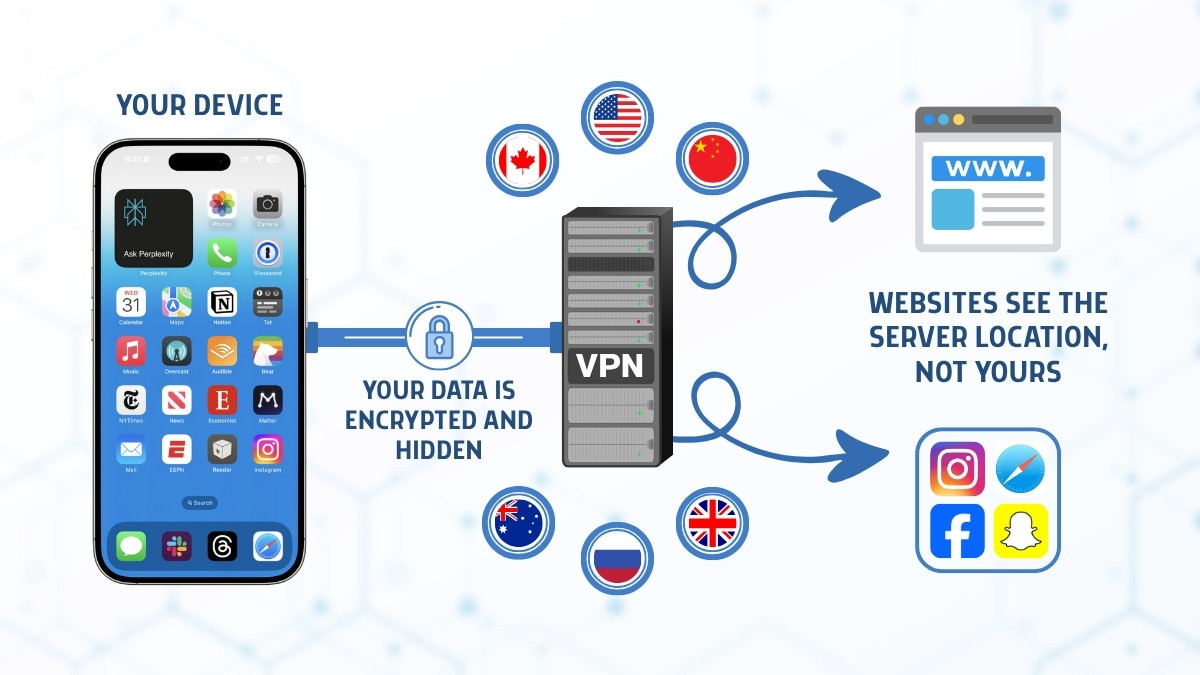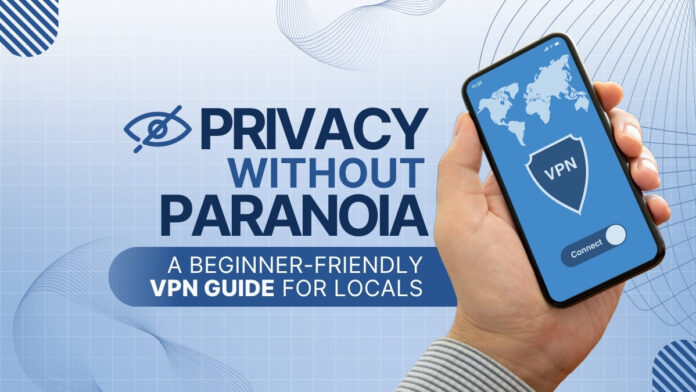Have you started to overthink your internet privacy recently? No worries, this happens to anyone. In our technological and digital-focused world, protecting your privacy online has never been more vital. The idea of cybersecurity sometimes feels overwhelming, but that really matters nowadays. Don’t think twice, we are here to help you with this.
This beginner-friendly VPN guide will cover the essentials of Virtual Private Networks (VPNs) in a simple, non-tricky, and non-challenging way, helping you take control of your privacy without falling into paranoia and overthinking.
What Does VPN Stand For?
First, let’s review some basics: VPN stands for Virtual Private Network. It’s a tool that provides a secure, encrypted connection between your device and the internet. Imagine it as a private tunnel that helps to protect your data, bypass restrictions, and access the world of the internet.
Now let’s check some features and how they work.
VPN Features: What to expect?
A VPN masks your IP address (your digital location) and encrypts all the data you send or receive online while traveling on the internet. It hides your online activity from:
- Hackers on public Wi-Fi
- Your internet service provider (ISP)
- Government surveillance (depending on your country)
- Websites and advertisers that are tracking your behavior
This means that with the help of VPNs, you can browse, stream, and download with more confidence and freedom.
How Does a VPN Connection Work?
A VPN connection refers to the secure link or tunnel between your device and the VPN server. It acts like a medium for your internet data, keeping it hidden and protected from potential thieves. The working system of the VPNs is very easy to understand.
Here’s how a VPN works in simple terms:
- You install a VPN app or a VPN extension on your device.
- You connect to a server in a location of your choice (e.g., the UK, US, or your own country). Or if you want to access, for example Chinese library website, you choose Chinese as GEO.
- The VPN encrypts your internet traffic and sends it through the server tunnel.
- To websites and services, it looks like you are browsing from that server’s location, not your actual one. So your data is secured and encrypted.

Should I Use a VPN?
Nowadays, everyone needs a VPN, especially if they care about privacy, online freedom, or accessing content without restrictions. So yes, you should use a VPN.
The main scenarios where you will need a VPN are:
- Using public Wi-Fi (e.g., cafes, airports)
- Avoiding ISP tracking and data selling
- Bypassing local internet censorship
- Watching streaming content not available in your region
- Protecting personal information while traveling
One of the best things about VPNs is that you don’t have to be a tech expert or a hacker to benefit from them. It’s a practical tool for everyday internet users with intuitive and easy-to-navigate steps.
How to Use a VPN: Basic Steps
VPNs are so easy to use. Using them is simpler than their working process. Similar to every digital tool, they require some basic steps to take to connect the servers to your machine. Here’s how to use a VPN in just a few steps:
- Choose a VPN provider (no worries, we’ll share the best VPNs for 2025 below).
- Download and install the VPN app or the extension on your device (it can be a laptop, smartphone, or tablet).
- Create an account and log in using your credentials.
- Open the app or the extension and select a server location.
- Tap Connect. And that’s it, your VPN is now protecting you and your data is now secured.
To turn off VPN, just open the app and click the “Disconnect” button. Your internet traffic will return to its normal boring life.
Best VPNs 2025: Top 3 Picks Reviewed
We understand that choosing a VPN can be a hard challenge because the market is really huge, and it can be really overwhelming. After researching dozens of providers, here are our Top 3 Best VPNs for 2025 based on security, speed, and ease of use:
1. NordVPN
NordVPN takes your cybersecurity to the next level. It offers malware protection, tracker blocker, and AD blocker. By choosing NordVPN, you don’t have to worry about your data being stolen. It will give you a fast and stable connection everywhere.
- Pros: Fast server networks, advanced encryption, excellent privacy features (like Double VPN and Threat Protection)
- Platforms: Windows, macOS, iOS, Android, Linux, browser extensions
- Why it’s great: Nord VPN combines military-grade security with user-friendly apps. Ideal for both beginners and experts. Also, you can use one account for around ten devices.
Enjoy internet freedom with NordVPN now!
2. Proton VPN
With a free plan, Proton VPN offers a lot of great features. This is one of the secure VPNs because all its network traffic is encrypted using strong protocols. It also has a great feature kill switch. This feature automatically turns off your machine from the internet if your VPN connection drops somehow.
- Pros: Strong Swiss privacy laws, open-source apps, no-log policy
- Platforms: Windows, macOS, Linux, Android, iOS
- Why it’s great: Created by scientists from CERN, Proton VPN offers a reliable free VPN tier and advanced features for premium users.
Try out Proton VPN’s free plan today
3. ExpressVPN
And our last choice as the best VPN is, of course, ExpressVPN. This VPN has servers in over 100 countries, stable privacy with data encryption, 24/7 live chat support, and other features to make users’ lives better on the internet.
- Pros: Excellent for streaming, ultra-fast, audited no-log policy
- Platforms: All major devices, including routers and smart TVs
- Why it’s great: ExpressVPN has been a long-time leader. It’s powerful, consistent, and highly secure.
Secure your data with highly rated ExpressVPN!
What Is the Best VPN Overall?
All three are, of course, excellent choices. But NordVPN remains the best VPN for 2025 due to its great combination of speed, security, and usability.
However, Proton VPN is perfect for privacy purists, and ExpressVPN shines when it comes to streaming and global access. So just choose one of them based on your needs.
Free VPN vs Paid VPN: What’s the Difference?
Users always search for “free VPN” or “VPN free” in search engines, but it’s important to understand the cons of free VPNs. While there are free VPN services, many come with limitations and risks:
- Slower speeds
- Limited server locations
- Data caps (e.g., 500MB/month)
- Potential privacy concerns (some free VPNs log or sell your data)
If you just want to try out how VPNs work, a free VPN can be useful for the short time use. But for serious privacy or daily use, a trusted paid VPN is a much safer and more reliable option.
Final Thoughts: Privacy Without Paranoia
Caring about personal privacy and security is vital because we live in a digital world where every moment, your data can be in danger. A VPN is a smart, simple tool that gives you peace of mind when you think about your internet privacy. Whether you want to watch your favorite shows from abroad, protect yourself on public Wi-Fi, or just browse without being watched, a VPN makes it possible easily.
Best of all? You can do it without becoming paranoid or overwhelmed by tech. Choose a reliable VPN, connect in seconds, and enjoy a safer internet experience.
Start today, your privacy deserves it
Common VPN Questions Answered
Is it legal to use a VPN?
Yes, in most countries. Some authoritarian regimes do restrict or ban VPNs, so always check your local laws. For example, in China, Russia, or North Korea, using a VPN is or restricted or regulated by the government.
Can a VPN slow down my internet?
Yes, slightly, but premium VPNs like Nord, Proton, or Express have optimized servers that minimize this. This mostly happens because your data is being encrypted and routed through a remote server, which can add a bit of latency.
Can I use a VPN for streaming or gaming?
Absolutely. Many use VPNs to access different Netflix regions or play games not available locally. For gaming, a VPN can help players across the world connect to servers in other countries and even access early game releases. It can also provide a more stable connection in some cases.
Do I need to use a VPN all the time?
This only depends on your goals and needs. For regular privacy, yes. For casual use (e.g., public Wi-Fi), you can turn it on only when needed. Many businesses and people use VPNs every day, so to answer this question, you need to understand why you need a VPN first.
Why do you use a VPN? Share your reasons in the comments below!


